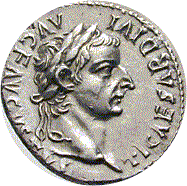When I
was a child, I collected coins. Growing
up in England in the pre-Euro zone days, it was pretty easy to travel around
Europe collecting different coins from different countries and, when my dad
would travel for business, he’d bring back coins from more far-flung
places. I was fascinated at first by the
different sizes, shapes and colors, by the different ways value was shown, and
finally by the different values projected by the coins in a deeper sense: how
did each nation make a statement about who they were by how they decorated
their coins? Now, I soon came to realize
that coin-designers did not tend to be especially imbued with the virtue of
national humility, but none that I can remember made as bold a claim as that
coin the Pharisees produced from their own purse at Jesus’ request.
The
coin they produced would have been a particular kind of denarius which was the
only coin that could be used to be the kēnsos,
or census tax, being discussed here.
Anyone hearing the story in Matthew’s time would have known what would
have been written on that coin: the Emperor’s full name, Tiberius Caesar filius Divi Augusti Augustus. Tiberius Caesar Augustus, son of the Divine
Augustus. The coin the Pharisees were
carrying through Jerusalem, the Holy City, was a blasphemy. The coin claimed that Caesar was the son of a
god. And this coin, they carry in the presence
of the true Son of God.
Now,
of course, the Pharisees would have told anyone listening that the coin’s
phrasing proclaimed a falsehood, that Augustus was not really divine. But, there’s danger in casually handling the
false, the blasphemous, and that’s that they couldn’t recognize Truth Himself
when he stood before them. They would
have admitted that divinity didn’t reside in Roman Imperial Power, in military
might, oppression and worldwide conquering.
But, they couldn’t see it in front of them either, couldn’t see that
divinity did reside in this poor, homeless, wandering preacher, of uncertain
parentage, who had been a refugee in Egypt, who didn’t even have a wife, who
dined with tax collectors and sinners.
They couldn’t see that this, this was the Son of God.
But,
we can. That’s what we’re gathered for
here today. To proclaim that the Son of
God is here in our midst, present in the body of Christ, the gathered assembly,
present in the priest ordained, present in the Word proclaimed, and present
most preciously in bread, broken and shared, and wine, poured out as
blood. Yes, we can see the Son of God
here, so we gather, and so we’re sent out.
We’re sent out because we can also see the Son of God present in the
poor served, we see Jesus gratefully accepting our gift whenever we serve the
least of these, because Christ made himself least, that we might be great in
grace.
We are
made rich in the things of God. What’s
true of the church in Thessalonica that Paul loved so much is true of us too:
the gospel has come to us not in word alone, but also in power and in the Holy
Spirit. We are chosen, we are beloved by
God, and hence we are brothers and sisters, adopted as daughters and sons of
God ourselves, not by being born of an emperor, but through participation in
Christ’s death and resurrection through the waters of baptism. We are gifted, and what’s more, we are made
gift ourselves, so when Christ commands to give the things of God to God, we
know we’re all included in the arc of that summons, as givers, as gifts.
A
Cardinal Archbishop caused some raised eyebrows among the press and even among some
of his brother bishops this past week by saying that the Church needed to do a
better job of recognizing the gifts of our gay and lesbian sisters and
brothers. I think we could do with
expanding that list before we worry about any nuancing and precifying that his
statement may need. How many gifts do we
ignore, in each other, and in ourselves?
There are some gifts that are easy to give and even easier to receive. There are some that weigh on us more, and we
don’t want to move them or see them in another.
Can we
see as gift and then offer as gift our own brokenness? Can we see how God might be calling us to
give, not from our strength, but from our weakness? Can we give the gift of our unsureness, our fragility,
our vulnerability? It’s because Jesus gifted
us with his openness to wound that we are gift, wounded gift, and not less gift
because we still stand in need of healing.
Can we
accept as gift the witness of the rejected?
The voices of those pushed to the margins, told their disorder is
somehow worse from the disorder of sin that infects us all, told they can’t
love right? Because Jesus was pushed
aside, is still pushed aside by so many, and loves with a brilliance we can
only dare to dream of, but do dare to
dream of. Loved on a cross. Loved as a gift, that we might be gift. What would it look like, if we gave to God
the things of God?

No comments:
Post a Comment